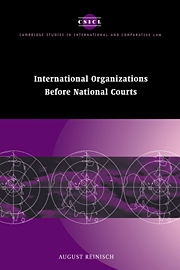Book contents
- Frontmatter
- Contents
- Preface
- Acknowledgements
- Table of cases
- Table of legal instruments
- List of abbreviations
- 1 Purpose, subject and methodology of this study
- PART I DESCRIPTIVE ANALYSIS
- PART II POLICY ISSUES
- PART III FUTURE DEVELOPMENTS
- 6 Do national courts provide an appropriate forum for disputes involving international organizations?
- 7 Conclusions
- Bibliography
- Index
- Cambridge Studies in International and Comparative Law
6 - Do national courts provide an appropriate forum for disputes involving international organizations?
Published online by Cambridge University Press: 18 December 2009
- Frontmatter
- Contents
- Preface
- Acknowledgements
- Table of cases
- Table of legal instruments
- List of abbreviations
- 1 Purpose, subject and methodology of this study
- PART I DESCRIPTIVE ANALYSIS
- PART II POLICY ISSUES
- PART III FUTURE DEVELOPMENTS
- 6 Do national courts provide an appropriate forum for disputes involving international organizations?
- 7 Conclusions
- Bibliography
- Index
- Cambridge Studies in International and Comparative Law
Summary
The final chapter of this study is intended to provide at least some tentative suggestions of how courts should approach disputes involving international organizations as parties before them, and whether and under what conditions they should use their adjudicative power or abstain from doing so. Such an attempt can only be based on the firm ground provided for by the existing case law analyzed in Part I and the rationales for and against adjudication addressed in these cases and discussed in Part II.
Critical appraisal of the quality of the existing case law
As far as the rationales for and against adjudication are concerned, to build upon the reasons advanced in the decisions of national courts in an uncritical way would be irresponsible. Although the analysis in Part II has probably demonstrated the predominance of certain arguments (e.g., guaranteeing the independent functioning of international organizations, requiring abstention or fairness to third parties calling for adjudication, etc.), national idiosyncrasies as well as the difference in the ‘objective’ quality of the legal reasoning used by different courts make a cautious approach towards the reasons advanced advisable.
A critical distance in the evaluation of the case law and its rationales will also contribute to a better appraisal of the issues involved. Such a viewpoint seems to be particularly appropriate in order to draw final conclusions from the wide and sometimes confusing range of options offered in the cases analyzed.
- Type
- Chapter
- Information
- International Organizations before National Courts , pp. 317 - 390Publisher: Cambridge University PressPrint publication year: 2000

